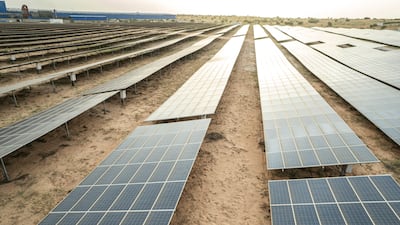Dubai-based Amea Power has signed two new agreements at the Cop28 climate conference to develop renewable energy projects in Africa, according to its chairman.
The company is set to develop a $600 million wind farm in Ethiopia, which could produce 300 megawatts of energy, Hussain Al Nowais told The National on the sidelines of the UN summit.
Amea Power is in talks with the African Development Bank, the International Finance Corporation and the Abu Dhabi Fund for Development (ADFD) to finance the project.
Ethiopia, the second-most populous nation in Africa after Nigeria, relies heavily on hydropower and plans to increase its capacity to 13.5 gigawatts by 2040.
The country’s rapid gross domestic product growth in the past decade has driven a steady rise in electricity demand.
Despite its renewable energy potential, the country faces power shortages and load shedding due to the challenge of serving a population in excess of 120 million and meeting a projected 30 per cent annual increase in electricity demand.
Amea Power’s wind project will be built in Aysha, 120km from the port of Djibouti, Mr Al Nowais said.
The company has also teamed up with Zimbabwe's state-owned power utility Zesa to develop a solar plant in the country.
Amea Power will begin with 30 megawatts and increase capacity based on demand.
Mr Al Nowais said the project would cost about $1 million per megawatt, which is “the rule of thumb we normally use … depending on the prices [and] the market conditions”.
“Zimbabwe is a country rich with resources, whether it's platinum or gold or zinc … [and] the mining industry desperately needs power.”
Currently, coal and hydroelectric power plants provide most of the country’s electricity.
Zimbabwe plans to reach a power generation capacity of 17,000MW by 2030, up from about 4,500MW currently.
The project could be a part of an initiative launched by the UAE in September to invest $4.5 billion in clean energy projects in Africa, Mr Al Nowais said.
The programme includes Abu Dhabi-based renewable energy company Masdar, ADFD, Etihad Credit Insurance, Amea Power and Africa50, an investment platform.
Developing countries together require about $1.7 trillion a year to fund their clean energy sectors but managed to attract foreign direct investment worth only $544 billion last year, Unctad said in a report in July.
Amea Power was founded in 2016 and has significantly increased its investment in wind, solar, energy storage, green hydrogen and water desalination projects as part of its long-term commitment to the global energy transition.
Africa focus
The continent has been a big area of focus at Cop28 as it trails behind other regions in climate-related investment.
Africa requires $2.8 trillion between 2020 and 2030 to implement its Nationally Determined Contributions under the Paris Agreement, according to the Climate Policy Initiative.
India-based International Solar Alliance aims to raise $100 million for its solar facility, a payment guarantee mechanism to encourage investment in solar energy.
"We have got commitments of about $39 million as we speak and I'm hoping that by the end of the first quarter of 2024, we will be at the $100 million mark," Ajay Mathur, director general of the ISA, told The National.
"This particular facility is looking at [a] payment guarantee mechanism for decentralised solar projects in Africa."
Renewable energy players and governments have underscored the importance of private capital in climate finance.
Investment needs to be guaranteed by governments in developing countries to boost investor confidence in project completion, Mr Mathur said.
"Domestic regulations need to be [put in place] to ensure that the price is as low as possible and that the returns are protected," he said.






